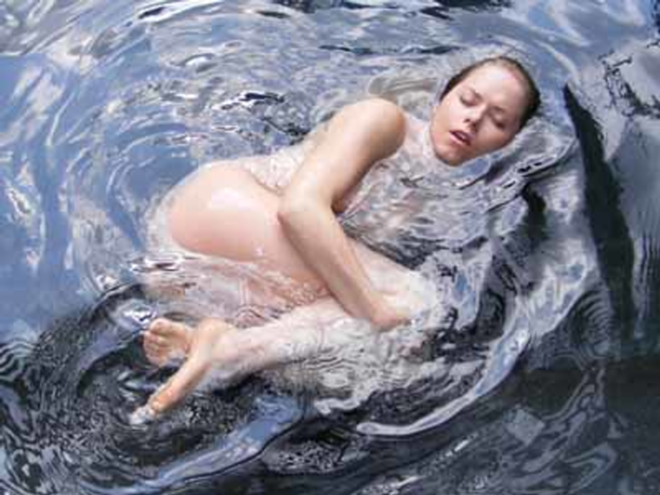
August Strindberg's A Dream Play is notoriously hard to stage, and even though the brave actors at Tampa's Jobsite Theater give it their best, the result is so clunky and earthbound as to be unsatisfying.
You've got to like them for trying, though: Ever since its premiere in Sweden (it was closed after 12 performances), this bizarre meditation on everything negative on Earth has mostly been conspicuous through its absence from theater marquees. Miss Julie is repeatedly revived; The Dance of Death and The Father turn up from time to time, but Strindberg the surrealist — author of Ghost Sonata, To Damascus and A Dream Play — mostly stays on the page, daring anyone to bring him to life.
Jobsite hasn't done it. On a nearly bare (decidedly un-dreamy) stage, nine performers whine and writhe for 70 minutes, and still Strindberg's paranoid vision is not persuasive. It could possibly work as a film, with lots of special effects and monsters that don't look like men wearing masks. But at the Tampa Bay Performing Arts Center, Strindberg's opus is mostly a freak show. Seldom has a "dream" seemed less ethereal.
What Strindberg wanted from the play he wrote down in its preface: "Time and space do not exist. … Imagination spins and weaves new patterns made up of memories, experiences, unfettered fancies, absurdities and improvisations. The characters are split, double and multiply; they evaporate, crystallize, scatter and converge."
What we get in English dramatist Caryl Churchill's adaptation are some stubbornly flesh-and-blood characters representing schematically distinct problems. There's the sensitive goddess Agnes (Kari Goetz), who's come to earth to discover what human life is like; there's a military officer (Steve Mountan) who waits endlessly for his beloved to meet him; there's an attorney (Steve Garland) whose objective is to show us how love always fades; and there's a writer (Spencer Myers) whose purpose is to sum up all human complaints.
No one splits, doubles or multiplies, and no effort is made, as in some productions, to convince us that all the figures are sides of a single dreamer. There are also some minor characters, including a blind plutocrat (Jason Vaughan Evans) and a woman (Amy E. Gray) who spends much of the play on her hands and knees trying to paste the world together.
Occasionally a poorly imagined prop is dragged onstage: most notably a hokey-looking locked door behind which the secret of the universe is hiding. And there's a tower — never seen — which supposedly grows as the action continues. Ultimately, there's lots and lots of talk about filth, loneliness, lost love and other forms of human misery.
You will learn that the sea is salty because of sailors' tears and that you can't even kill yourself without paying for it later. You will learn that repetition of tasks is a curse on humanity, and that dirt is everywhere, no matter how much you clean. You will even learn that former lovers, upon divorcing, can become extremely vicious! And when you tell yourself, "Hey, this play is just a little one-sided" — well, then, you've finally met Strindberg, theatrical innovator and clinical paranoid. He was a genius and a madman.
Both sides of him are on display here.
If director Chris Holcom and the Jobsite actors can't turn this text into a dream — and honestly, the job is no easy one for any company — still they manage to deliver several ingratiating performances. Best of all is Kari Goetz, who, as the heavenly Agnes, displays a wide-eyed innocence of a sort we seldom find except in fairy tales. Yes, a young woman of this sort might look on human life and find it pitiable; and yes, Goetz's Agnes seems herself entirely free of any flaws (besides the Strindbergian hatred of dirt).
Also excellent is Steve Garland, as a lawyer who demonstrates that married life can be torture — one spouse's pleasure is the other's pain, one's sympathies are the other's antipathies, and not even a baby can repair broken love. Particularly likable is Spencer Myers as the writer who ends up in a cave with distraught Agnes, and who, perhaps more than any other character, seems humanly compassionate.
The case of Steve Mountan is more complicated: His Officer is a caricature of repeatedly disappointed love, and as such it fails to touch us as a more human portrayal might. But he's also the most memorable personage in the whole play. "Unreal" is the word I'd use for Christen Petitt as the ghostly doorkeeper: With her coat full of human sorrow and her vigilance lest her door be opened, she does seem like a figure out of a nightmare (Kafka's as much as Strindberg's). Jason Evans turns in good work both as a fierce schoolteacher and as that blind rich man mentioned earlier, and Ami Sallee Corley, Amy E. Gray and Soolaf Rasheid are fine in smaller roles.
Brian Smallheer's set — or rather, lack of a set — is a problem. A dusty-looking bare stage backed with translucent plastic sheeting is hardly the space in which to feel that we're dreaming, and no prop — certainly not a phony-looking monster head — ever evokes that weird reality we all know from our night visions. Katrina Stevenson's vaguely antiquated costumes are adequate, though a more consistent group of clothes might have helped.
At the end, what's most phony about A Dream Play isn't its characters or its props but its claim that human life is nothing but misery and conflict. The real world is, rather, a contradiction, containing good and evil, happiness and sorrow, a celebration in one house while folks grieve next door. It may be hard to artistically accommodate this paradox (Shakespeare managed by mixing comedy into his tragedies), but to assert that all is suffering just isn't true to the life we know.
One leaves A Dream Play as Strindberg, in his preface, said we would: joyful that life isn't as terrible as depicted. But if the play's not to be taken seriously, why view it? It's a question that the Jobsite production — audacious as it is at its best — never manages to answer.














